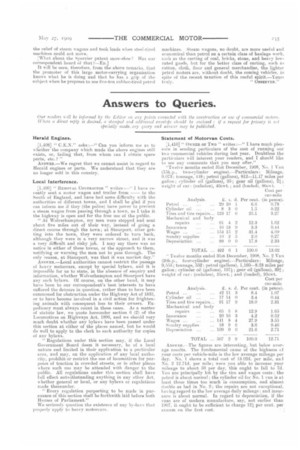Answers to Queries.
Page 17

If you've noticed an error in this article please click here to report it so we can fix it.
Our readers will be informed by the Editor on any points connected with the construction or use of ce»nmercial motors. EVhere a. direct reply is desired, a stamped and addressed envelope should be enclosed : if a request for privacy is not specially made, any query and answer may be published.
Herald Engines.
[1,408] " C.E.N." asks :-" Can you inform me as to whether the company which made the above engines still exists, or, failing that, from whom can I obtain spare parts, etc.? "
AxswErt.-We regret that we cannot assist in regard to Herald engines or parts. We understand that they are no longer sold in this country.
Local Interference.
[1,409] " REMOVAL CONTRACTOR " writes :-" I have re cently sent a motor wagon and trailer from to the South of England, and have had some difficulty with the authorities of different towns, and I shall be glad if you can inform me if they (the police) have power to prevent a steam wagon from passing through a town, as I take it the highway is open and for the free use of the public.
" At Wolverhampton, my men were stopped and sent about five miles out of their way, instead of going a direct course through the town; at Stourport after getting into the town, they were ordered to turn back, although they were in a very narrow street, and it was a very difficult and risky job. I may say there was no notice in either of these towns, or the approach to them, notifying or warning the men not to pass through. The only reason, at Stourport, was that it was market day."
ANSWER.-Local authorities cannot restrict the passage of heavy motorcars, except by special bylaws, and it is impossible for us to state, in the absence of enquiry and information, whether Wolverhampton and Stourport have any such bylaws. Of course, on the other hand, it may have been to our correspondent's best interests to have suffered the detours in question, rather than to have been summoned for obstruction under the Highway Act of 1835, or to have become involved in a civil action for frightening animals with consequent loss to their owners. Expediency must always count in these cases. As a matter of statute law, we quote hereunder section 6 (2) of the Locomotives on Highways Act, 1896, and we should very much doubt whether any bylaws have been passed under this section at either of the places named, but he would do well to apply to the clerk to each authority for copies of any bylaws.
" Regulations under this section may, if the Local Government Board deem it necemary, be of a local nature and limited in their application to a particular area, and may, on the application of any local authority, prohibit or restrict the use of locomotives for purposes of traction in crowded streets, or in other places where such use may be attended with danger to the public. All regulations under this section shall have full effect notwithstanding anything in any other Act, whether general or local, or any bylaws or regulations made thereunder.
" Every regulation purporting to be made in pursuance of this section shall be forthwith laid before both Houses of Parliament."
We seriously question the existence of any by-la we that propetly apply to -heavy motorcars.
Statement of Motorvan Costs.
[1,410] " OwNER or Two " writes :-" I have much pleasure in sending particulars of the cost of running our too commercial vehicles during last year. Doubtless the particulars will interest your readers, and I should like to see any comments that you may offer."
"Twelve months ended 31st December, 1908, No. 1 Van (15h.p., two-cylinder engine).-Particulars: Mileage, 9,073 ; tonnage, 4183 petrol (gallons), 812-11.17 miles per gallon ; cylinder oil (gallons), 93; gear oil (gallons), 2+ weight of ear: (unladen), 46cwt.; and (loaded), 80cwt.
" Twelve months ended 81st December, 1908, No, 2 Van (20h.p., four-cylinder engine).-Particulars : Mileage, 9,555; tonnage, 552; petrol (gallons), 1,160-8.23 miles per gallon; cylinder oil (gallons), 197i ; gear oil (gallons), 39*;,, weight of car: (unladen), 55cwt.; and (loaded), 95cwt.
ANswta.-The figures are interesting, but below average results. The fundamental cause of the highness cf Your costs per vehicle-mile is the low average mileage per day. No. L shows a total cost of 13.02d. per mile, and No. 2 12.71d. per mile; were you able to increase your mileage to about 50 per day, this ought to fall to 7d. You are principally hit by the tire and wages costs; the petrol is about normal ; the cylinder oil for No. 1 van is at least three times too much in consumption, and almost double as bad in No. 2; the repairs are not exceptional, haviug regard to the low average daily mileage: and insurance is about normal. In regard to depreciation, if the vans are of modern manufacture, say, not earlier than 1907, it ought to be sufficient to charge 12!,; per cent. per annum on the first. cost.




















